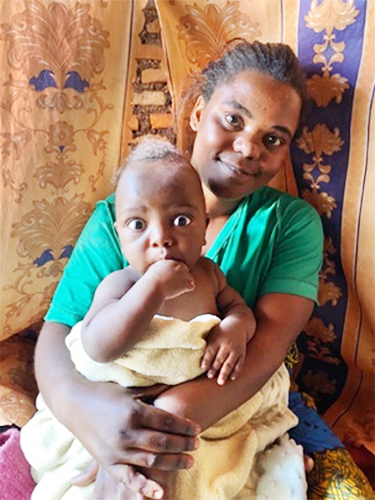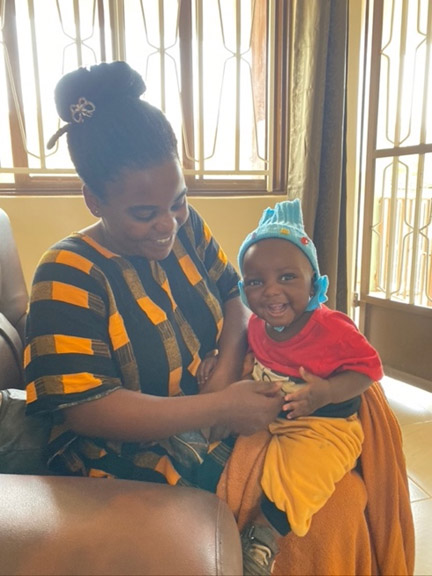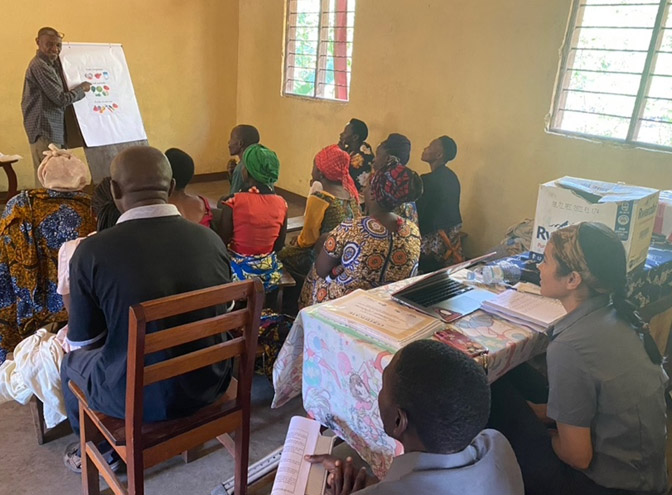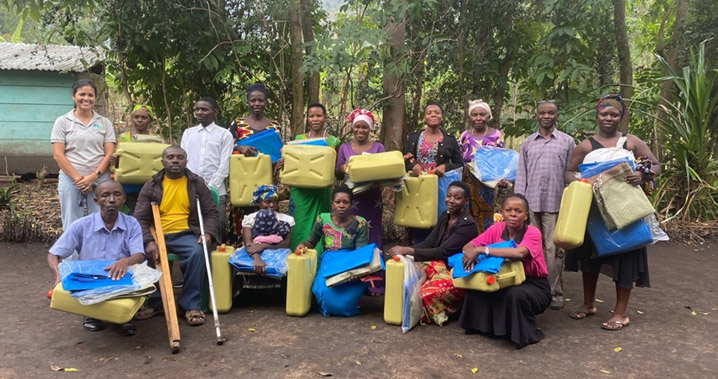
The beautiful, rolling hills of the Rwenzori region hide an uncomfortable fact; nearly 55% of the Bakonzo children are stunted or chronically malnourished. Throughout their lives, if health conditions are not addressed with better nutrition, they will have infections, cognitive issues that stifle learning and even premature death.
Families are fighting back.
Nestled in the hills of Kasese, Joy lives with her three children. She represents thousands of young mothers who struggle daily in gardens to eke out 82 cents per day. Joy is one of 32 family heads that took a new community nutrition program designed by GlobalRise; and it’s truly changing her life.
“Our field workers are trained and spreading the program in the community,” said Karen Salazar, RD, a nutritionist with GlobalRise who has dedicated the past 6 years creating both an orphanage and nutrition program that meets local dietary needs. The program is being rolled out in the Rwenzori Mountains where the Bakonzo population is estimated at one million.

Faced with poor nutrition and extreme poverty, zero infrastructure and climate change, leaders in the community gathered at the Kasese Better Living Center to develop a plan and created a battle-cry to “Kick Stunting Out of Kasese!”
Officially tasked to build a community nutrition program, GlobalRise, after 5years of research, is building a Digital Food System – a multi-thematic community initiative that impacts nutrition, health, finance (linking mountain farmers to markets using drones), soil fertility, saving indigenous knowledge and more.
“The plight of the Bakonzo represents the height of inequity across so many issues,” said Tom Dean, chair of GlobalRise. The organization believes that by improving nutrition in a sustainable way, GlobalRise can send a wave of improvement in household income, health and more; helping families to pay for school, improve home sanitation and more. There are many ways that a Digital Food System could transform life for extremely poor mountainous farmers.
Building our Community Nutrition Program

To design a useful and sustainable program, GlobalRise first surveyed how local foods are used, cultural practices, dietary preferences, infrastructure and much more. The team was already working in the field for three years so, equipped with knowledge from implementing a “Farm to Plate Protocol” at Christalis Home (local orphanage), GlobalRise designed a meaningful survey. Specialists in surveying indigenous populations at the University of Costa Rica were consulted as well.
Next, two local Bakonzo were trained to administer the survey using the local language, Lukonzo. As they delivered the survey, they geo-marked each home so we could return with any questions.
Once administered, the survey data was shared with nutrition experts including Sylvia Klinger, DBA, RD, board member of GlobalRise, and Lauri Wright, PhD, president-elect of the Academy of Nutrition and Dietetics and Executive Director of University of Northern Florida’s Center for Nutrition and Food Security. GlobalRise’s lead nutritionist, Karen Salazar, RD, then authored the Community Nutrition Program or CNP, engaging with our field partners for local context.
Working through the pandemic, the CNP was finally completed and ready for implementation during our 2022, three-month mission. Three villagers, all Bakonzo, were selected for our “train the trainer” education – an intensive 2-week program that included a focus group of 6 families. Adjustments were made before it was re-tested with two more focus groups in succession – both over 13 families. Finally, our CNP was born!

Today, our trainers continue to administer and improve the CNP with families in Kasese. Our nutritionist, working remotely, guides the program’s effectiveness and collects outcomes that will be used in our first grant. GlobalRise is writing this grant in 2023 in a teaming relationship with Baylor Uganda, a 20-year project of Baylor University in Texas.
With our CNP in operation, GlobalRise is focusing on a cargo drone system to carry crops from mountain farms to food markets and settle financial transactions. This “uber in the sky” is being designed to help the local people to improve finances – a key requirement for sustainability.
An exit survey of CNP attendees showed enthusiastic acceptance of this technology, especially among the women heads of household who indicated it could save over 12 hours walking every week. This could improve finances, increase time with family and improve family life.

